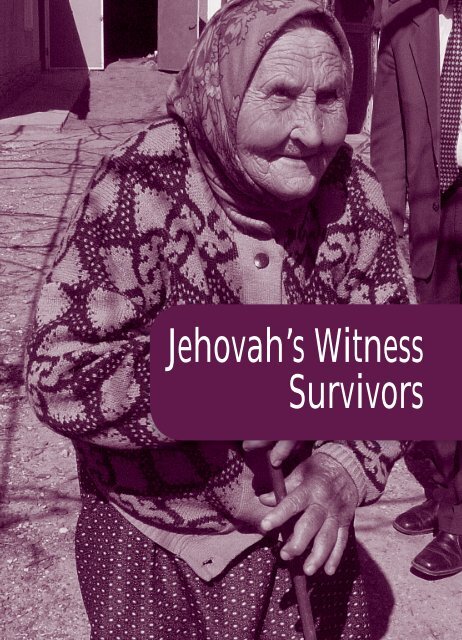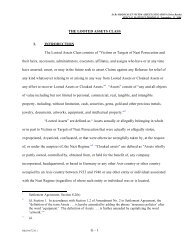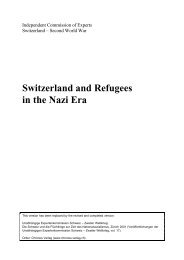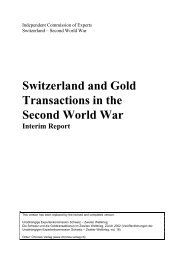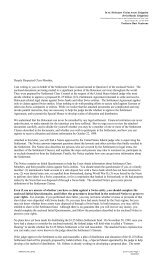Jehovah's Witness survivors - Swiss Banks Settlement: In re ...
Jehovah's Witness survivors - Swiss Banks Settlement: In re ...
Jehovah's Witness survivors - Swiss Banks Settlement: In re ...
You also want an ePaper? Increase the reach of your titles
YUMPU automatically turns print PDFs into web optimized ePapers that Google loves.
Jehovah’s <strong>Witness</strong><br />
Survivors<br />
189
Throughout th<strong>re</strong>e years of HSP project implementation, the Jehovah’s<br />
<strong>Witness</strong> Holocaust Era Survivors Fund (JWHESF) assisted<br />
1,876 <strong>survivors</strong> in Croatia, Hungary, Moldova, Poland, Romania, the<br />
Russian Federation and Ukraine.<br />
Projects and beneficiaries assisted<br />
Total beneficiaries 1,876<br />
Men 32%<br />
Women 68%<br />
Service providers 1<br />
Projects implemented* 1<br />
Implementation period Mar 2002-Jul 2005<br />
Average project length* 39 months<br />
*<strong>In</strong>itial project and extensions count as one.<br />
Assistance b<strong>re</strong>akdown<br />
Percentage of total project expenditu<strong>re</strong> on assistance<br />
100<br />
75 67.8%<br />
50<br />
25.2%<br />
25<br />
6.9%<br />
0<br />
Material Medical Non-material<br />
Jehovah’s <strong>Witness</strong> beneficiaries assisted<br />
Country<br />
No. of beneficiaries<br />
Croatia 3<br />
Hungary 12<br />
Moldova 186<br />
Poland 109<br />
Romania 243<br />
Russian Federation 23<br />
Ukraine 1,300<br />
Total 1,876<br />
Out<strong>re</strong>ach<br />
The JWHESF was the only organization identified with the capacity to<br />
locate and assist eligible members of this victim group. The JWHESF<br />
declined the additional task of identifying and assisting <strong>survivors</strong> who<br />
may have been Jehovah’s <strong>Witness</strong>es during the Nazi occupation but<br />
we<strong>re</strong> no longer members of this community.<br />
190
Beneficiaries<br />
HSP assistance <strong>re</strong>ached needy Jehovah’s <strong>Witness</strong> <strong>survivors</strong> in seven<br />
Central and Eastern European countries. The JWHESF identified<br />
priority needs, including medical and dental assistance (in the form of<br />
p<strong>re</strong>scription medicines, hospital t<strong>re</strong>atment, dentu<strong>re</strong>s and eyeglasses),<br />
winter assistance (fuel and heating bills) and food. Clothing, home<br />
ca<strong>re</strong> and emergency financial support (mainly for minor home<br />
<strong>re</strong>pairs) we<strong>re</strong> also provided to Jehovah’s <strong>Witness</strong> beneficiaries.<br />
Survivors in Romania spoke of being targeted by Nazi-era persecution<br />
for “public instigation” or “neutrality” (i.e. <strong>re</strong>fusing military service),<br />
<strong>re</strong>sulting in internment, forced labour or flight. <strong>In</strong> the occupied north<br />
of Moldova, elderly Jehovah’s <strong>Witness</strong>es described beatings, forced<br />
labour and executions. Ukrainian <strong>survivors</strong> <strong>re</strong>counted their pa<strong>re</strong>nts’<br />
ar<strong>re</strong>sts and <strong>re</strong>membe<strong>re</strong>d how, as child<strong>re</strong>n, they we<strong>re</strong> persecuted for their<br />
family’s affiliation with the cong<strong>re</strong>gation. A majority of beneficiaries<br />
interviewed by IOM spoke of continued persecution after the end of the<br />
war on account of <strong>re</strong>ligious practices.<br />
Beneficiary account<br />
Constantin lived in Edinet, once located in Soviet<br />
Moldova. He told IOM how, during the war, adult<br />
Jehovah’s <strong>Witness</strong>es we<strong>re</strong> ar<strong>re</strong>sted and sentenced<br />
for “neutrality” on account of their faith. Some we<strong>re</strong><br />
deported, never to <strong>re</strong>turn.<br />
Older child<strong>re</strong>n we<strong>re</strong> left to ca<strong>re</strong> for the family, or we<strong>re</strong><br />
sent with younger siblings to orphanages in Romania,<br />
only to <strong>re</strong>turn after the war to the burnt ruins of their<br />
former homes.<br />
<strong>In</strong> a country with an inadequate national health scheme,<br />
monthly pensions of around US$ 4-15, and rural poor<br />
subsisting on b<strong>re</strong>ad and porridge, <strong>survivors</strong> gladly<br />
accepted medical, food and home heating assistance.<br />
191
Projects<br />
The JWHESF <strong>re</strong>lied on its network of local bethels (church cent<strong>re</strong>s)<br />
and volunteers for the implementation of two consecutive projects<br />
over a th<strong>re</strong>e-year period. Projects we<strong>re</strong> administe<strong>re</strong>d by JWHESF<br />
headquarters in the United States of America, which was <strong>re</strong>sponsible for<br />
collecting and compiling beneficiary and financial <strong>re</strong>cords, tracking<br />
project <strong>re</strong>sources and <strong>re</strong>porting to IOM. The delivery of assistance to<br />
this survivor group was monito<strong>re</strong>d by IOM staff from Geneva and in<br />
<strong>re</strong>levant field offices.<br />
The JWHESF worked in cooperation with Watch Tower Society branch<br />
offices. These had extensive networks of community-based volunteers<br />
in each of the countries of operation. JWHESF procedu<strong>re</strong>s for aid<br />
delivery and monitoring allowed the transfer of funds to beneficiaries<br />
who then purchased the needed assistance. Receipts we<strong>re</strong> collected by<br />
local community leaders. <strong>In</strong>dividual beneficiary <strong>re</strong>cords we<strong>re</strong> <strong>re</strong>gularly<br />
updated by project staff and volunteers.<br />
Project overhead costs we<strong>re</strong> kept low and assistance st<strong>re</strong>amlined<br />
by using local volunteers, who assisted beneficiaries with medical<br />
Assistance b<strong>re</strong>akdown and beneficiaries assisted<br />
Type of assistance<br />
% of beneficiaries<br />
<strong>re</strong>ceiving assistance<br />
% of total project<br />
expenditu<strong>re</strong> on assistance<br />
Material<br />
Food (except food packages) 76.6 20.6<br />
Food packages 0.0 0.0<br />
Clothing 33.1 6.6<br />
Winter assistance 79.0 27.4<br />
Emergency financial support 12.5 3.6<br />
Hygienic supplies 0.0 9.6<br />
Medical<br />
Medical and/or dental assistance 79.7 25.2<br />
Non-material<br />
Homeca<strong>re</strong> 34.6 7.0<br />
Legal assistance 0.0 0.0<br />
Social assistance 0.0 0.0<br />
192
appointments, safe and proper use of aid items and banking arrangements.<br />
All JWHESF personnel and volunteers associated with this<br />
programme we<strong>re</strong> <strong>re</strong>qui<strong>re</strong>d to keep detailed <strong>re</strong>cords and to account to<br />
JWHESF headquarters for the handling of funds.<br />
Project implementation <strong>re</strong>lied on the beneficiaries’ timely submission<br />
of <strong>re</strong>ceipts for the purchase of assistance. Delays in <strong>re</strong>ceipt collection<br />
and <strong>re</strong>porting on expenditu<strong>re</strong>s <strong>re</strong>sulted in IOM’s withholding contracted<br />
payments until satisfactory documentation had been provided.<br />
Ukraine had the largest number of Jehovah’s <strong>Witness</strong> beneficiaries.<br />
Project implementation was hinde<strong>re</strong>d by the Ukrainian Committee on<br />
Humanitarian Aid’s prolonged delay in approving a tax exemption for<br />
project funds intended to benefit its country’s <strong>survivors</strong>.<br />
A majority of<br />
beneficiaries<br />
interviewed by IOM<br />
spoke of continued<br />
persecution after<br />
the end of the war<br />
on account of<br />
<strong>re</strong>ligious practices.<br />
193
Overhead costs we<strong>re</strong><br />
kept low thanks to local<br />
volunteers.<br />
Each eligible survivor <strong>re</strong>ceived a description of possible assistance<br />
and selected the items most needed. JWHESF <strong>re</strong>ported that urban<br />
beneficiaries most often <strong>re</strong>quested food and hygienic supplies as well<br />
as medical assistance. Those living in apartments with basic utilities<br />
did not often seek winter <strong>re</strong>lief. <strong>In</strong> contrast, this was a priority for<br />
beneficiaries in the countryside who needed coal or fi<strong>re</strong>wood to heat<br />
their homes. Jehovah’s <strong>Witness</strong> <strong>survivors</strong> also benefited from medical<br />
assistance, including medications, eyeglasses, prostheses and other<br />
items that facilitated mobility or otherwise improved the quality of<br />
their lives.<br />
Conclusion<br />
As with other beneficiary groups, HSP assistance to Jehovah’s <strong>Witness</strong><br />
victims add<strong>re</strong>ssed often overwhelming needs for humanitarian aid.<br />
The service provider encounte<strong>re</strong>d <strong>re</strong>latively few difficulties in delivering<br />
individualized assistance thanks to each local elder’s intimate<br />
knowledge of their communities. Survivors exp<strong>re</strong>ssed gratitude for HSP<br />
assistance, which supplemented their modest pensions, allowed them<br />
to add<strong>re</strong>ss urgent health and nutritional concerns and provided them<br />
with heating and house <strong>re</strong>pairs.<br />
194
Project overview<br />
HSP project* Beneficiaries Coverage Assistance types Start End<br />
Jehovah’s <strong>Witness</strong> Holocaust<br />
Era Survivors Fund<br />
3 Croatia<br />
12 Hungary<br />
186 Moldova<br />
109 Poland<br />
243 Romania<br />
23 Russian Federation<br />
1,034 Ukraine<br />
3 Croatia<br />
9 Hungary<br />
186 Moldova<br />
Jehovah’s <strong>Witness</strong> Holocaust<br />
Era Survivors Fund (1 st <strong>re</strong>vision)<br />
103 Poland<br />
219 Romania<br />
23 Russian Federation<br />
1,300 Ukraine<br />
Jehovah’s <strong>Witness</strong>, total** 1,876<br />
Food (except for food packages), clothing,<br />
winter assistance, homeca<strong>re</strong>, emergency financial<br />
support, medical and dental assistance<br />
Food (except for food packages), clothing,<br />
winter assistance, homeca<strong>re</strong>, emergency financial<br />
support, medical and dental assistance<br />
Mar 02 Mar 04<br />
Apr 04 Jul 05<br />
* <strong>In</strong>itial projects and project extensions a<strong>re</strong> listed separately.<br />
** Beneficiaries assisted under mo<strong>re</strong> than one project or extension a<strong>re</strong> counted only once.<br />
Note on project names: “Revision” denotes extension of an existing project.<br />
195
Working with Jehovah’s <strong>Witness</strong> <strong>survivors</strong><br />
Some lessons learned<br />
1. IOM <strong>re</strong>spected the organization and principles of the Jehovah’s <strong>Witness</strong> world community in order to <strong>re</strong>ach <strong>survivors</strong>.<br />
The sometimes uneven level of <strong>re</strong>sponsiveness and limited experience of community members in humanitarian<br />
assistance was compensated by the excellent access these provided to <strong>survivors</strong> still affiliated with the group.<br />
2. IOM did not involve its field offices in initial project development. This was handled di<strong>re</strong>ctly between Geneva and<br />
IOM’s partner in New York according to the latter’s wishes. As a <strong>re</strong>sult, IOM field staff found it especially challenging to<br />
monitor the project effectively due to the lack of established local <strong>re</strong>lationships or <strong>re</strong>gular contact with institutional<br />
counterparts at the country level.<br />
3. The programme benefited from substantial input by Jehovah’s <strong>Witness</strong> community members that was not charged<br />
to the programme. The efforts of these “volunteers” helped keep administrative project costs among the lowest in<br />
HSP. Nevertheless, the lack of administrative funds allocated by IOM’s partner to its country teams also contributed to<br />
making the <strong>re</strong>gularity of their work, <strong>re</strong>porting and follow-up with beneficiaries problematic.<br />
196
Conclusion<br />
197
Impact, analysis and lessons learned<br />
IOM’s Humanitarian and Social Programmes (HSP) achieved <strong>re</strong>sults<br />
that would have been unimaginable over five years ago, when the US<br />
Court and the German Foundation first turned to the Organization.<br />
IOM collaborated with mo<strong>re</strong> than 60 external service providers to deliver HSP<br />
assistance worth over US$ 32 million to needy elderly Roma, Jehovah’s <strong>Witness</strong><br />
and disabled <strong>survivors</strong>. <strong>In</strong> locations whe<strong>re</strong> the identification of suitable partner<br />
organizations was unsuccessful, IOM implemented projects di<strong>re</strong>ctly, including<br />
the delivery of assistance to homosexual <strong>survivors</strong>.<br />
IOM found many mo<strong>re</strong> <strong>survivors</strong> than expected. The Organization had<br />
to periodically modify programme and project parameters in order to<br />
deliver appropriate kinds and quantities of aid. Field <strong>re</strong>alities <strong>re</strong>qui<strong>re</strong>d<br />
that both IOM and service providers <strong>re</strong>main flexible and permit<br />
adjustments in project schedules and budgets, allowing HSP assistance<br />
to <strong>re</strong>ach a constantly inc<strong>re</strong>asing number of beneficiaries. HSP projects<br />
in nearly all countries of implementation we<strong>re</strong> extended and expanded<br />
to include additional <strong>survivors</strong> and to match programme capacities<br />
with victims’ needs. Nevertheless, many project partners found<br />
eligible persons who could not be assisted due to time and <strong>re</strong>source<br />
limitations.<br />
Food packages, followed by winter assistance (p<strong>re</strong>dominantly homeheating<br />
fuel) and hygienic supplies (soap, disinfectants, towels)<br />
we<strong>re</strong> the kind of available aid most <strong>re</strong>quested by beneficiaries. All<br />
we<strong>re</strong> conside<strong>re</strong>d essential for daily survival. These th<strong>re</strong>e categories<br />
accounted for nearly 72 per cent of all HSP assistance delive<strong>re</strong>d. They<br />
formed the backbone of a programme in which, to the initial objectives<br />
of <strong>re</strong>cognition and comfort for needy victims, IOM had no choice but to<br />
add that of life-sustaining aid.<br />
198
Partners with the capacity to deliver and account for individualized<br />
and complex assistance provided mo<strong>re</strong> sustainable, non-material<br />
aid. Generally less expensive than material forms, social, legal and<br />
medical assistance at first generated limited inte<strong>re</strong>st among beneficiary<br />
communities. This was despite the fact that non-material aid, if it<br />
could be provided, could mean higher pensions, f<strong>re</strong>e healthca<strong>re</strong> and<br />
better housing.<br />
Beneficiaries, local service providers and IOM found that HSP assistance<br />
dramatically improved the quality of life and outlook of thousands of<br />
marginalized and often forgotten <strong>survivors</strong> of Nazi persecution. IOM<br />
only located and assisted a portion of those who might have fulfilled<br />
eligibility criteria. Assistance provided no mo<strong>re</strong> than a “lifeline” in<br />
communities whe<strong>re</strong> needs we<strong>re</strong> wide-ranging and di<strong>re</strong>. While HSP<br />
may have brought long-awaited <strong>re</strong>cognition of past suffering and a<br />
temporary <strong>re</strong>lief from overwhelming hardships, it also exposed a<br />
variety of survivor and community needs, many of which a<strong>re</strong> likely to<br />
<strong>re</strong>main unadd<strong>re</strong>ssed for years to come.<br />
Many project partners<br />
found eligible persons<br />
who could not be<br />
assisted due to time and<br />
<strong>re</strong>source limitations.<br />
199
Wide-ranging needs<br />
<strong>re</strong>main unadd<strong>re</strong>ssed<br />
both for many<br />
<strong>survivors</strong> and their<br />
broader communities.<br />
<strong>In</strong>ternational humanitarian and social assistance for non-Jewish<br />
Holocaust victims is a new and particularly challenging undertaking.<br />
Survivors gradually overcame their initial fear and distrust of<br />
outsiders. Many broke into tears when <strong>re</strong>ceiving aid, in most cases the<br />
first, albeit meag<strong>re</strong>, <strong>re</strong>cognition of their suffering in nearly 60 years.<br />
Others, while still grateful, often begged IOM to help younger family<br />
members instead, as they we<strong>re</strong> “old and help would no longer make a<br />
diffe<strong>re</strong>nce”. Many told IOM that HSP had made the diffe<strong>re</strong>nce between<br />
f<strong>re</strong>ezing or starving and another season of “getting by”. Al<strong>re</strong>ady in sad<br />
confirmation of this, IOM heard during the winter of 2005-2006, as<br />
the programme was winding down, of former beneficiaries dying from<br />
hypothermia.<br />
By engaging several partners in each country, IOM contributed<br />
to the emergence of a network of NGOs able to observe rigorous<br />
200
implementation, accounting and <strong>re</strong>porting standards. Some of IOM’s<br />
most successful partners we<strong>re</strong>, in fact, ethno-cultural, commercial and<br />
political entities. When given the opportunity to access donor <strong>re</strong>sources<br />
in order to help their own people, they proved themselves capable of<br />
taking on humanitarian and social assistance tasks. Many young<br />
Roma leaders with whom IOM collaborated demonstrated practical<br />
insights, flexibility and enthusiasm.<br />
IOM confirmed that capacity building for NGOs, inevitable in the course<br />
of <strong>re</strong>sults-driven activities, works better as a programme “by-product”<br />
than a di<strong>re</strong>ct output. HSP project development, implementation and<br />
monitoring <strong>re</strong>qui<strong>re</strong>ments, together with <strong>re</strong>gular and close cooperation,<br />
assu<strong>re</strong>d successful partners of substantial improvements in certain<br />
competencies.<br />
<strong>In</strong> the case of the Roma, HSP contributed indi<strong>re</strong>ctly, yet significantly,<br />
to the emergence of a stronger, mo<strong>re</strong> <strong>re</strong>p<strong>re</strong>sentative civil society<br />
sector, better equipped to administer futu<strong>re</strong> assistance for vulnerable<br />
communities. It is IOM’s hope that HSP also foste<strong>re</strong>d and leaves behind<br />
inc<strong>re</strong>ased mutual trust between Roma and outsiders, as well as new<br />
information on community needs and how to meet them.<br />
A job still undone<br />
IOM <strong>re</strong>ached approximately half of the eligible <strong>survivors</strong> in Central and<br />
Eastern Europe. The unexpectedly high number of victims identified<br />
proved that Holocaust <strong>survivors</strong> we<strong>re</strong> both originally mo<strong>re</strong> numerous<br />
and have lived longer than was p<strong>re</strong>viously thought.<br />
<strong>In</strong> January 2004, IOM <strong>re</strong>sponded to a <strong>re</strong>quest for proposals from the<br />
US Court with a <strong>re</strong>quest for additional <strong>re</strong>sources for HSP. The proposal<br />
seeks between US$ 59 and 214 million, depending on the amount of<br />
possible unclaimed <strong>re</strong>sidual funds that may be available for additional<br />
humanitarian assistance to members of the <strong>Swiss</strong> <strong>Banks</strong> “Looted<br />
Assets” class. Should additional settlement funds be made available<br />
in the futu<strong>re</strong>, IOM is positive that many eligible <strong>survivors</strong> could still<br />
be identified and assisted, especially Roma, Sinti and the disabled.<br />
201
It estimates that the<strong>re</strong> will still be almost 100,000 non-Jewish class<br />
members living in poverty in Central and Eastern Europe in the year<br />
2013.<br />
Assistance funded from the German Foundation’s original contribution<br />
to HSP ended in June 2005. US Court projects continued through<br />
January 2006.<br />
<strong>In</strong> December 2005, thanks to a donation by Dr. Friedrich Christian Flick,<br />
the German Foundation granted IOM additional <strong>re</strong>sources of some<br />
EUR 415,000 for assistance to Sinti and Roma former forced and slave<br />
labou<strong>re</strong>rs. These funds we<strong>re</strong> managed separately from original donor<br />
contributions and made it possible for IOM to extend HSP projects in<br />
two countries on a <strong>re</strong>duced scale, for two mo<strong>re</strong> months. <strong>In</strong> case further<br />
German Foundation <strong>re</strong>sources become available in the near futu<strong>re</strong>,<br />
notably funds left over from unpaid slave and forced labour claims,<br />
IOM would plan to utilize them in a similar manner.<br />
202
Basic assistance to IOM’s four victim groups, especially Roma and<br />
disabled, essentially comes to an end with HSP. <strong>In</strong>ternational aid to<br />
vulnerable communities in Central and Eastern Europe generally targets<br />
younger members through projects aimed at c<strong>re</strong>ating education<br />
and employment opportunities, or community leaders through<br />
training, capacity building and political participation projects. While<br />
considerable <strong>re</strong>sources a<strong>re</strong> expended, few benefits trickle down to the<br />
most needy, at least in the short or medium term. IOM’s temporary<br />
support to <strong>survivors</strong>, while providing long-awaited <strong>re</strong>cognition<br />
of past persecution and suffering, largely failed to generate longterm<br />
improvements in beneficiary or community living conditions.<br />
Ironically, IOM came to <strong>re</strong>alize that the very <strong>re</strong>cognition of their<br />
suffering, however late, may have contributed to <strong>re</strong>newed trauma<br />
and feelings of abandonment and despair once assistance was, in the<br />
perception of many inexplicably, terminated.<br />
Anticipating these and other consequences for beneficiaries of<br />
programme termination, IOM has sought, without success, to expand<br />
HSP’s donor base. <strong>In</strong>ternational donors understandably p<strong>re</strong>fer<br />
sustainable assistance as less costly and mo<strong>re</strong> likely to leave behind<br />
something of “lasting value”. While individual states generally accept<br />
that it is their <strong>re</strong>sponsibility to ca<strong>re</strong> for citizens unable to look after<br />
themselves, the number of persons in need in Central and Eastern<br />
Europe far exceeds that of HSP-eligible beneficiaries or the cur<strong>re</strong>nt<br />
means of the emerging economies to help their own.<br />
As may have been expected, <strong>survivors</strong> helped by IOM under HSP often<br />
said they hoped assistance could continue for the <strong>re</strong>st of their lives. <strong>In</strong><br />
spite of this, many of the victims identified by IOM in the course of<br />
the programme will die in conditions worse than any they experienced<br />
since 1945.<br />
<strong>In</strong> case significant additional <strong>re</strong>sources a<strong>re</strong> made available for survivor<br />
projects in the coming years, activities must account for evolving<br />
<strong>re</strong>qui<strong>re</strong>ments. A prog<strong>re</strong>ssively older victim population will best be served<br />
through flexible and <strong>re</strong>sponsive modes of assistance. Throughout the<br />
earlier phases of the programme, IOM <strong>re</strong>ceived <strong>re</strong>quests for assistance<br />
that fell outside approved criteria, including housing for the elderly,<br />
203
Assistance b<strong>re</strong>akdown and beneficiaries assisted (all beneficiary groups)<br />
Food (except food packages)<br />
Food packages<br />
Clothing<br />
Winter assistance<br />
Emergency financial support<br />
Hygienic supplies<br />
Medical assistance<br />
Homeca<strong>re</strong><br />
Legal assistance<br />
Social assistance<br />
% of beneficiaries <strong>re</strong>ceiving assistance<br />
% of total project expenditu<strong>re</strong> on assistance<br />
0 20 40 60 80 100<br />
Per cent<br />
While strategic initiatives<br />
a<strong>re</strong> needed to add<strong>re</strong>ss<br />
the root causes of Roma<br />
poverty, without basic<br />
survival assistance<br />
access to communities<br />
may be problematic.<br />
full-time homeca<strong>re</strong>, contributions to community sanitation projects<br />
and funeral expenses. <strong>In</strong> any case, IOM anticipates that medical<br />
and homeca<strong>re</strong> will soon be as important to them as food and winter<br />
assistance.<br />
While much may still be unfinished, a lot has been accomplished.<br />
Even if HSP is not someday <strong>re</strong>vived, donors may be satisfied that in just<br />
a few years they have helped many mo<strong>re</strong> persons than was originally<br />
expected. IOM laid the groundwork for futu<strong>re</strong> interventions and will<br />
maintain links with key partners through other activities, the<strong>re</strong>by<br />
ensuring that it is positioned to <strong>re</strong>sume survivor assistance when and<br />
as needed.<br />
After HSP…<br />
Wide-ranging needs <strong>re</strong>main unadd<strong>re</strong>ssed both for many <strong>survivors</strong><br />
and their broader communities. These include basic humanitarian<br />
assistance and housing, mo<strong>re</strong> complex healthca<strong>re</strong>, social and legal<br />
counselling, as well as employment and educational opportunities<br />
204
for younger Roma cur<strong>re</strong>ntly unable to support themselves and their<br />
families. <strong>In</strong>ternational donors and national governments have spent<br />
much in past decades on Roma education, cultural p<strong>re</strong>servation and<br />
leadership capacity-building. Recent international initiatives aiming<br />
at changing the lives of Roma in Central and Eastern Europe focus<br />
mainly on education, employment, health and housing, a<strong>re</strong>as whe<strong>re</strong><br />
prog<strong>re</strong>ss may accelerate social inclusion and the improvement of the<br />
economic and social status of Roma across the <strong>re</strong>gion.<br />
While strategic initiatives a<strong>re</strong> needed to add<strong>re</strong>ss the root causes of<br />
Roma poverty, without basic survival assistance access to communities<br />
may be problematic.<br />
205
“To elevate dramatically<br />
the level of service in<br />
the short term, building<br />
expectations among<br />
needy <strong>survivors</strong>,<br />
only to <strong>re</strong>move the<br />
funding and thus the<br />
assistance, would be<br />
a g<strong>re</strong>at disservice to<br />
those who may grow<br />
to depend upon their<br />
food packages, medical<br />
aid and home visits.“<br />
– Special Master’s Plan,<br />
p. 135<br />
IOM field offices continue to work with former HSP partners to develop<br />
and implement mo<strong>re</strong> sustainable projects for community members<br />
of all ages in the a<strong>re</strong>as of health, employment c<strong>re</strong>ation, education<br />
and community stabilization. Without their continued engagement<br />
in support of vulnerable groups, the network of NGOs that HSP has<br />
foste<strong>re</strong>d is likely to fragment, thus depriving Roma communities of<br />
what had become life-saving support. Conversely, IOM believes that<br />
further cooperation with the international community will <strong>re</strong>inforce<br />
grassroots <strong>re</strong>p<strong>re</strong>sentative capacity and st<strong>re</strong>ngthen the foundations of<br />
an inc<strong>re</strong>asingly competent Roma civil society sector. IOM will look for<br />
the best use of its international structu<strong>re</strong> and service a<strong>re</strong>a synergies<br />
in support of projects benefiting Roma. The Organization will seek to<br />
build upon its existing expertise and network of partners, as well as to<br />
foster and improve <strong>re</strong>lationships with community-level <strong>re</strong>p<strong>re</strong>sentatives<br />
and NGOs, international agencies and other stakeholders active in the<br />
field of Roma assistance. As it did in HSP, IOM will involve beneficiaries,<br />
local NGOs and community <strong>re</strong>p<strong>re</strong>sentatives in project development,<br />
delivery enhancement and <strong>re</strong>view.<br />
Through its ongoing work with communities whose members we<strong>re</strong><br />
victims of the Nazi Holocaust, IOM will continue to honour the persons<br />
we have had the privilege to assist under HSP.<br />
206
“Thank you for the coal<br />
and for <strong>re</strong>membering us.”<br />
Polish survivor


